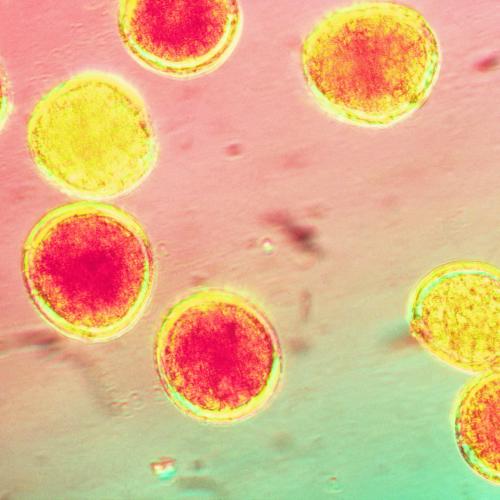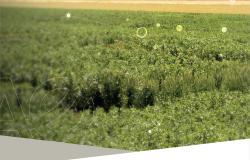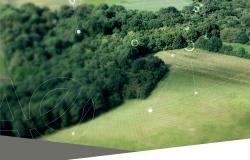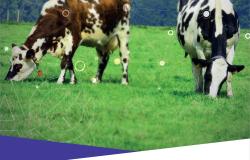Interdisciplinary scientific foresight studies: clarifying our goals

The studies covered strategic topics combining a wide range of issues such as agroecology; predictive approaches in biology and ecology; health at the core of the relationship between food, agriculture and the environment; the future of livestock farming; the bioeconomy; and natural, food and environmental risks.
Nearly 250 INRAE scientists contributed to those prospective studies together with researchers from other organisations such as INRIA, CNRS and INSERM, and the reports produced were discussed by INRAE's scientific board.
Each report identified scientific challenges and priorities as well as the actions needed to implement them and, more broadly, support INRAE's strategy in the following areas:
- Scientific leadership to bring communities together and develop interdisciplinary collaboration
- Support for innovative research projects and scientific facilities
- Capacity building
- Developing collaboration with academic and social and economic partners
- INRAE's influence and appeal
- Linkages with expertise and public policy support.
These interdisciplinary scientific studies helped clarify INRAE's scientific aspirations through to the year 2030 and underpin the creation of our second generation metaprogrammes and development of the divisions' future strategic frameworks.
Agroecology

As a scientific discipline, agroecology puts ecology back at the heart of farming-system design and support for system transition and is now embedded in our research efforts. The lines of research to be developed are aimed at increasing the diversity of living organisms within agroecosystems to make them more robust and more resilient. Diversifying species, varieties, crop sequences, etc. leads to a greater variety of products, which has a significant impact on agrifood sectors and systems from production modes to the products consumed. Bringing about such multiscale changes requires a long-term approach. Specific focus is placed on the use of genetics, landscape ecology and modelling. Adaptive agroecological transition developed in collaboration with stakeholders is in itself a research area that involves both economics and the social and human sciences.
> Report, document and press release (French only)
DOI: 10.15454/heimwa
PREDICTIVE APPROACHES IN BIOLOGY AND ECOLOGY

Such approaches are closely linked to the increasingly interdisciplinary nature of science, the explosion of "big data", and the major changes brought about by the transition to digital technology and artificial intelligence. They not only form part of goals to gain an in-depth understanding of biological and ecological systems but also those to predict their reactions to global changes that are complex, dynamic and uncertain. The themes dealt with covered all scales from understanding metabolic pathways to organisms' behaviours in the environment, from the concept of holobionts to predicting contaminant exposure, from farming practices to consumption, and from biological invasions to the environmental impact of global change. A final cross-sector methodology theme identified challenges in the areas of data and information systems and related analyses.
> Press release (French only)
DOI: 10.15454/1.5783037069682676e12
Health Nexus

The "nexus" approach explores the complex relationships that exist between our health and the food we eat - through food quality and diet -, but also agricultural production and its impact on the environment, whose status does have an influence on our health. Considering global health as a possible driving force for changes to food systems led this study to highlight research aimed, in particular, at gaining a better understanding of the links between the various mechanisms that affect human health via food production and consumption, ecosystem dynamics, and air and water pollution. This resulted in a description of the avenues of research to be given priority in order to move forward in designing and evaluating catalysts for action (innovations, public policies, stakeholder behaviours) likely to make possible the transitions needed to improve the impact food systems have on global health.
DOI: 10.15454/fycc-jx29
NATURAL, FOOD AND ENVIRONMENTAL RISK MANAGEMENT

This study led to a consensus on defining risk as a combination of a hazard or danger and the exposure and vulnerability of the parties at risk. This framework makes it possible to provide detailed explanations about interdependencies and cascade effects in cases where there are multiple sources of risk. In particular, it involves developing a common systemic framework for learning and action, providing answers to issues of society, and developing integrated approaches to better foresee, prevent and adapt to multiple hazards through study of their interactions and impacts.
DOI: 10.15454/db0p-0s25
Bioeconomy

INRAE's strategic approach is to provide solutions and contribute to better informed public decisions for sustainable circular bioeconomies rooted in the territories. This prospective study analyzed priorities for biomass production and its sustainable use against the backdrop of global change, while, at the same time, preserving resources and ecosystems. It also analysed issues related to optimising biomass conversion, while limiting the creation of waste and closing the carbon, nitrogen and phosphorus cycles. Finally, it tried to respond to the issue of organising and managing flows and markets in periods of strong uncertainty.
DOI: 10.15454/x30b-qd69
SCIENCES FOR THE FUTURE OF LIVESTOCK FARMING

In a view to rethinking livestock farming's place and role in achieving more sustainable farming and diets, the study analysed the situation and forces at work, explored possible future scenarios, and proposed a vision and ways forward for developing tomorrow's livestock operations. It allowed INRAE to identify the actions to be implemented to develop an ambitious research programme about and for the future of livestock farming so as to facilitate and support needed changes.
DOI: 10.15454/x83c-0674
